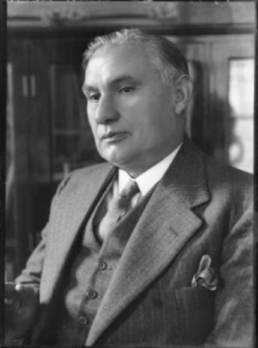These life stories may contain descriptions of childhood trauma and abuse, as well as images, voices and names of people now deceased. If you need help, you can find contact details for some relevant support services on our support page.
British working-class hero, Labour politician, and union activist Ernest Bevin (1881-1951) was in kinship care as a child.
Ernest Bevin was born into an impoverished family in Winsford, Somerset. His mother, Diana Tudball, was also known as Mercy Bevin. She married William Bevin in 1864 but was calling herself a widow four years before Ernest was born. She left the father’s name blank when she registered her son’s birth.
Ernest’s mother died of cancer when he was eight years old. The seven siblings were together for the final time at her funeral. Afterwards, the family’s possessions were sold and Ernest went to live with his older half-sister, Mary, and her husband, George Pope. He lived first at Morchard Bishop in Devon and then later in the nearby village of Copplestone.
Ernest attended Hayward Boys’ School, where he earned a Labour Certificate. He then left school in March 1892, shortly after his eleventh birthday. Because he had the opportunity to learn to read, Ernest read news articles to his family each evening around the fire. After leaving school, Ernest began working ten hours a day at work placements on local farms.
When he was thirteen years old, Ernest’s brother Jack suggested he move to Bristol to live with him. Ernest quickly agreed, and soon found work driving a van. A few years later, Ernest began doing unpaid secretarial work for the Bristol Right to Work Committee. In 1910, he formed a branch of the Dockers’ Union in Bristol and by 1918 was working as the Assistant General Secretary.
In 1921 he amalgamated several unions into the Transport and General Workers’ Union, of which he was general secretary until 1940 and which became the largest trade union in the world. From 1925 he was a member of the general council of the Trades Union Congress (TUC) and in 1937 was elected its chairman. He was prominent in organizing the general strike of May 3-12, 1926, and was also instrumental in settling it (Steer).
Ernest was appointed to Winston Churchill’s wartime government in May 1940. Soon after, he became a Member of Parliament for Wandsworth Central. He helped drastically transform the economy to ensure all human and material resources were allocated to the war effort.
Five years later, Ernest was chosen by then-Prime Minister Clement Attlee to serve as Foreign Secretary. Under Bevin’s leadership, the UK became an ally of the US against the USSR and recognised the People’s Republic of China in 1950. He also helped establish the Colombo Plan to strengthen economic development in the Asia-Pacific region.
Ernest resigned as Foreign Secretary in 1951 on his seventieth birthday. He passed away five weeks later, on April 14, 1951. He is remembered as one of the UK’s most powerful union leaders of his time.
“Ernie”, as he was almost universally known, was one of the greatest public figures of the mid-20th century in every sense, both for the huge impression his remarkable personality made on the public and for the colossal imprint he left on the course of history (Rawnsley).
References
“Ernest Bevin (1881-1951)”. BBC History. website. https://www.bbc.co.uk/history/historic_figures/bevin_ernest.shtml
“Ernie Bevin, Forgotten Political Giant.” Great Lives, BBC 4. https://www.bbc.co.uk/programmes/m000m5mg
Rawnsley, Andrew. (2020). “Ernest Bevin: Labour’s Churchill by Andrew Adonis – review”. The Guardian, 28 June 2020. https://www.theguardian.com/books/2020/jun/28/ernest-bevin-labours-churchill-by-andrew-adonis-review
Steer, Roger. (2002). “From the hedgerows of Devon to the Foreign Office.” Roger Steer website. http://www.rogersteer.com/from-the-hedgerows-of-devon-to-the-foreign-office/
Image available here.
